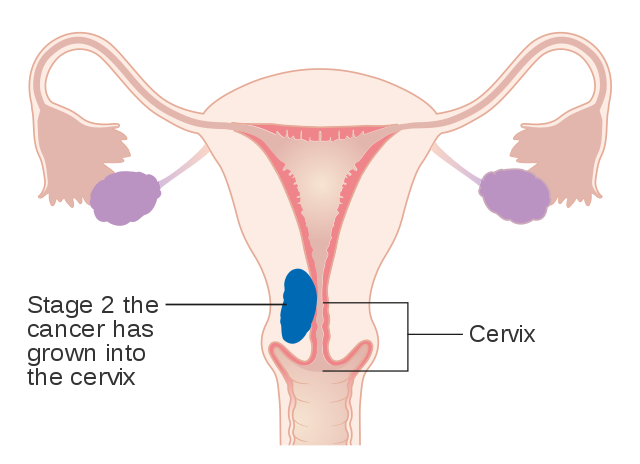- Stage 2 Endometrial Cancer
Overview
Stage 2 Endometrial Cancer diagnosis means that the cancer has spread into the connective tissue of the cervix, but has not spread outside of your uterus.
You can see the cancer here in blue on the right side of the uterus and how it is in the lining but has not gone beyond the uterus.
What Tests Will I Need and Why?
Blood and Imaging tests are done to understand your general health, confirm your diagnosis and determine your cancer stage.
Tissue analysis is also typically done through a biopsy to identify the cancer cell type, which is critical to finding the best treatment option for you.
If your treatment team has not already performed tests to determine your cancer’s features, please ask your doctor when these tests will be performed.
Re-read this summary as needed and then tap, “Compare My Treatment Options Now“. Our unique Comparison Page will help you understand your FDA-approved treatment options including, who can help you pay for your treatment, where and how each is given and what side-effects you may experience.

Cancer Research U.K. CC BY-SA 4
Recommended Endometrial Cancer Videos

Endometrial Cancer In The Black Community
Brought To You By Black Health Matters

Endometrial Cancer Overview
CDC Did You Know Series

How Cancer Spreads
Metastatic = Advanced

Diagnosing Your Cancer
How Does a PET Scan Work?

Diagnosing Your Cancer
How Does a CT Scan Work?

Exercise! You Can Do It
Reducing Side Effects & More
Commonly Searched Questions
Stage 2 Endometrial Cancer Treatment
Source: Cancer.org
Stage 2 Endometrial Cancer Symptoms
- changes in the length or heaviness of menstrual periods
- vaginal bleeding or spotting between menstrual periods
- vaginal bleeding after menopause
- pelvic pain
Source: Cancer.org
Stage 2 Endometrial Cancer Recurrence Rate
Source: PubMed.gov
Stage 2 Endometrial Cancer Survival Rate
Source: Cancer.gov
Stage 2 Endometrial Cancer Definition
Source: Cancer.gov
Stage 2 Endometrial Cancer Prevention
- Maintain a Healthy Weight: Obesity is a significant risk factor for endometrial cancer.
- Manage Diabetes: Properly manage diabetes to reduce risk.
- Use Birth Control Pills: Oral contraceptives may lower the risk.
- Discuss Hormone Therapy: If undergoing hormone replacement therapy, discuss its risks with your doctor.
Source: PubMed.gov














